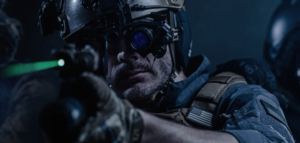 We recently tried out the clip-on night vision while playing stickball with friends. We are amazed at the opportunities that are opening up. Night turned into day, and we were able to conduct accurate aimed fire. Since we are certified divers, we are considering using night vision underwater. The amount of light drops sharply with depth, not to mention exploring the insides of sunken ships, and it would be excellent to improve visibility. We have outlined all our thoughts on this issue in this article.
We recently tried out the clip-on night vision while playing stickball with friends. We are amazed at the opportunities that are opening up. Night turned into day, and we were able to conduct accurate aimed fire. Since we are certified divers, we are considering using night vision underwater. The amount of light drops sharply with depth, not to mention exploring the insides of sunken ships, and it would be excellent to improve visibility. We have outlined all our thoughts on this issue in this article.
How Does Night Vision Work?
For a clear understanding of the subject of discussion, consider the principle of operation of night vision devices. The lens of the device collects the weak light reflected from the surfaces and directs it to the photocathode. The photocathode converts visible light into electrons. Electrons are directed into multiple tiny channels of a special plate and bombard its walls, thereby provoking a massive release of a huge amount of additional electrons. Thus, the signal is amplified. The resulting additional electrons hit the surface of the phosphor screen and are converted into photons – visible light. This light, different in shades, forms a picture on the screen of the night vision clip.
Does Night Vision Work Underwater?
A purely technical answer to this question is yes, it works. But he has nuances. Let’s pay attention to several important points. The most important of these is the medium in which light waves propagate.
The propagation of light waves in the air.
On the surface of the earth, this medium is air. It is saturated with water vapor, dust particles, snow, smoke, water droplets. Naturally, when passing through these saturated media, some of the photons collide with filler molecules and deviate from the course. That is, less light will reach the night vision lens than in an ideal vacuum space, where the path of light photons is absolutely free of obstacles. Air has a certain density and absorbs some of the radiation and scatters some.
Propagation of light waves in water.
Now let’s imagine an even denser structure of matter than air-water. Water is an ideal absorber of all types of radiation, from light to heat. Let’s take into account that sea water is saturated with salts. This makes the structure even more dense for the passage of light waves. Note that it becomes more difficult to find crystal clear water off the coast every year. Sometimes, even in clear water, a cloudy suspension raised from the bottom makes it impossible to clearly see objects during the day, not to mention night dives. But the density of the water isn’t the only factor that affects the performance of a night vision device underwater.
Distance.
Distance is just as important. The farther away the target is, the longer the photons of light will travel, and most of them will be lost on the way to the lens. Consequently, the less information the night vision device will have to process.
Waves and sea currents.
Not the least role is played by the fact that water in the natural environment is not stable. Most of it travels in waves, has eddies and currents. Irregular streams of water give distorted reflections from an infrared flashlight used in tandem with a night vision clip. Quite often, streams carry the IR light along with them, not delivering them back to the clip. In this case, a pulsed laser can help, which shoots with short bursts and forms a better image under water.
Water column pressure.
It will not be superfluous to note that the equipment must be designed for a certain immersion depth. As a rule, the manufacturer informs about this in the instructions for the device.
Test dives.
In order to understand how well your night vision device is performing, we recommend making a test dive under favorable conditions. We consider the following as favorable factors: calm surface without wind and storm; clear water with good visibility; shallow immersion depth. By equipping NV equipment with an infrared or laser flashlight, we will receive additional illumination, which will affect the quality of the picture. After the test, it will be clear what to count on. The quality of the picture is highly dependent on many factors and can only be taken into account empirically.
Underwater adventures will give you an unforgettable experience that most people cannot. We offer to expand your possibilities and acquire a mass of additional exciting episodes using night vision devices. The waterproof qualities of the night vision device have proven themselves in adverse weather conditions for hunting, fishing, outdoor sports, tourism and nature observation. The right equipment is half the success of the event. We recommend that you carefully consider the choice of equipment, set it up correctly, and then you can fully devote time to your favorite hobby.

